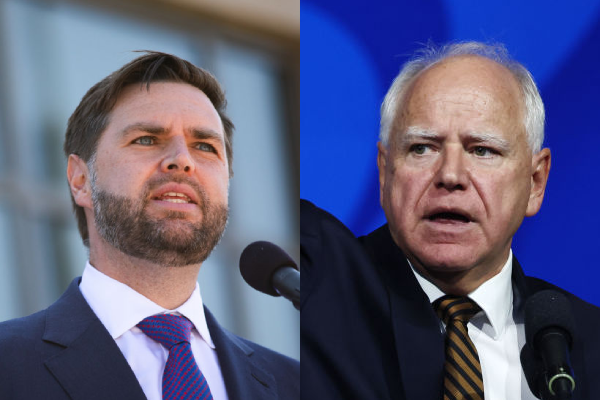
Washington — The vice presidential debate hosted by CBS News is set for Oct. 1 in New York City, with Democratic Gov. Tim Walz of Minnesota and GOP Sen. JD Vance of Ohio both agreeing to participate.
The debate will be moderated by “CBS Evening News” anchor and managing editor Norah O’Donnell and “Face the Nation” moderator and CBS News chief foreign affairs correspondent Margaret Brennan.
On Wednesday, CBS News proposed four dates for a debate between the two vice presidential nominees: Sept. 17, Sept. 24, Oct. 1, and Oct. 8. The Harris-Walz campaign soon agreed to the Oct. 1 date.
“See you on October 1, JD,” Walz wrote on X. A campaign official said Walz “looks forward to debating JD Vance — if he shows up.”
On Thursday, Vance posted on social media that he accepted the CBS News debate on Oct. 1, and said he also wanted to debate on CNN on Sept. 18.
“The American people deserve as many debates as possible, which is why President Trump has challenged Kamala to three of them already,” Vance wrote on X. “Not only do I accept the CBS debate on October 1st, I accept the CNN debate on September 18th as well. I look forward to seeing you at both!”
In the afternoon, Michael Tyler, the communications director for Vice President Kamala Harris’ campaign, said Walz will only participate in the CBS debate on Oct. 1. He also reiterated Harris intention to debate Trump on Sept. 10, and said she would agree to one more meeting sometime in October.
The vice presidential debate
Getty Images
A date for the vice presidential debate has been in limbo since the spring, when CBS News first extended the invitation to both presidential campaigns. In May, President Biden’s campaign said Harris, who was still his running mate at the time, was willing to face off against the eventual Republican vice presidential nominee on either July 23 or Aug. 13.
Former President Donald Trump picked Vance as his running mate on July 15, the first day of the Republican National Convention. His campaign soon declined to commit to a vice presidential debate before the Democratic National Convention on Aug. 19, saying that doing so would be premature since Harris might end up being the Democratic nominee.
Mr. Biden dropped out of the race on July 21, several weeks after his own poor showing at his debate with Trump. Harris quickly gathered the support needed to replace him atop the Democratic ticket and formally captured the nomination last week. She named Walz as her running mate, finalizing the vice presidential picks for both campaigns and kicking off a sprint to the election in November.
Last week, Trump said CBS News would host the vice presidential debate, and that Vance has “really stepped up” and is “doing a fantastic job.” He added that he was willing to participate in three debates with Harris in September, hosted by Fox News, ABC News and NBC News.
The Harris campaign initially committed to one debate, the Sept. 10 meeting on ABC. The Thursday statement from Tyler, Harris’ communications director, indicated she was open to one more the following month, saying “the American people will have another opportunity to see the vice president and Donald Trump on the debate stage in October.”
“The debate about debates is over,” Tyler said. “Voters deserve to see the candidates for the highest office in the land share their competing visions for our future. The more they play games, the more insecure and unserious Trump and Vance reveal themselves to be to the American people. Those games end now.”
This year is the first election cycle since 1988 in which the debates are not being organized by the nonpartisan Commission on Presidential Debates. In 2022, the Republican National Committee voted to ban GOP nominees from participating in debates hosted by the commission, accusing the organizers of bias in the two 2020 meetings between Mr. Biden and Trump.
Instead, television networks have been left to negotiate dates and terms for the debates directly with the presidential campaigns. CNN hosted the first debate of the cycle between Mr. Biden and Trump in June, a much earlier start than in previous election years. CNN allowed other networks to carry the debate on their airwaves, in keeping with the practice for debates hosted by the commission.






